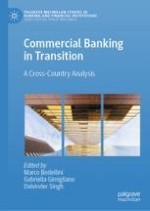2024 | OriginalPaper | Buchkapitel
19. Recent Changes and Prospects of Banking Services Regulations and Supervision in Korea
verfasst von : Sung-Seung Yun, GiJin Yang
Erschienen in: Commercial Banking in Transition
Aktivieren Sie unsere intelligente Suche, um passende Fachinhalte oder Patente zu finden.
Wählen Sie Textabschnitte aus um mit Künstlicher Intelligenz passenden Patente zu finden. powered by
Markieren Sie Textabschnitte, um KI-gestützt weitere passende Inhalte zu finden. powered by
